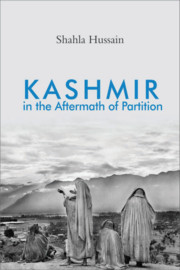Book contents
- Frontmatter
- Dedication
- Contents
- Acknowledgments
- Introduction
- 1 Meanings of Freedom in the Princely State of Jammu and Kashmir
- 2 Freedom, Loyalty, Belonging: Kashmir after Decolonization
- 3 Puppet Regimes: Collaboration and the Political Economy of Kashmiri Resistance
- 4 The Idea of Plebiscite: Discontent and Regional Dissidence
- 5 Mapping Kashmiri Imaginings of Freedom in the Inter-regional and Global Arenas
- 6 Jang-i-Aazadi (War for Freedom): Religion, Politics, and Resistance
- Conclusion
- Select Bibliography
- Index
6 - Jang-i-Aazadi (War for Freedom): Religion, Politics, and Resistance
Published online by Cambridge University Press: 15 January 2021
- Frontmatter
- Dedication
- Contents
- Acknowledgments
- Introduction
- 1 Meanings of Freedom in the Princely State of Jammu and Kashmir
- 2 Freedom, Loyalty, Belonging: Kashmir after Decolonization
- 3 Puppet Regimes: Collaboration and the Political Economy of Kashmiri Resistance
- 4 The Idea of Plebiscite: Discontent and Regional Dissidence
- 5 Mapping Kashmiri Imaginings of Freedom in the Inter-regional and Global Arenas
- 6 Jang-i-Aazadi (War for Freedom): Religion, Politics, and Resistance
- Conclusion
- Select Bibliography
- Index
Summary
Time went mad in villages and towns,
A macabre dance was there from dawn to dusk.
All, the young, the old and innocent brood,
Lost their peace, took to confined recesses.
Mothers saw their loved sons dying in their laps,
Whoever was found was driven to the gibbet,
Unknown phantoms engulfed sisters and brothers,
Children's fathers were taken to unknown places,
Doom overwhelmed every house of this land.
—Zarif Ahmad Zarif, “The Sparrow's Sorrow”Written by preeminent Kashmiri poet Zarif Ahmad Zarif, this verse captures the dismal situation in Kashmir after the armed insurgency of the late 1980s. This years-long fight between insurgents and the Indian state led to massive human rights violations in the Valley, whose inhabitants, regardless of their religious affiliation, bore the brunt of the war. The human tragedy that has since unfolded in Kashmir has impacted Kashmiri families, crystallized religious identities, and created a seemingly unbridgeable gap between its Hindu and Muslim communities, forever changing Kashmir's social and cultural landscape.
Most scholarship on the region views the Kashmir insurgency through the prism of Indian and Pakistani claims on the state, as a threat to the nation-states’ strategic security. Another strand of scholarship sees the insurgency as a reaction to India's failed democratic attempt to integrate Kashmiri Muslims. Others portray it as an Islamist movement sponsored by Pakistan, or, more recently, as a manifestation of Islamic terrorism or jihad. In this chapter, however, I unravel the complex ways religion and politics intertwined within Kashmiri discourse, differentiating between Kashmiri Muslim attachment to their religious and regional identity and the articulation of Islamist ideology by political groups that aimed to transform Kashmir into an Islamic state. This chapter asserts that Kashmiris’ disillusionment with the compromise politics of their mainstream political leaders provided a space for the advocates of political Islam to reshape concepts of self-determination in their interest, providing new Islamic frames of reference to construct and internalize political identity. Indeed, the Islamists attempted to rewire Kashmiri mindsets to reject imported nationalist models and embrace politics as an inseparable part of the Islamic faith. Meanwhile, the anti- Muslim rhetoric of the Hindu right in India and its increasing political power enhanced the already existing fears of Kashmiri Muslims that Hindu nationalists would erase their religiously informed cultural identity.
- Type
- Chapter
- Information
- Kashmir in the Aftermath of Partition , pp. 292 - 348Publisher: Cambridge University PressPrint publication year: 2021



